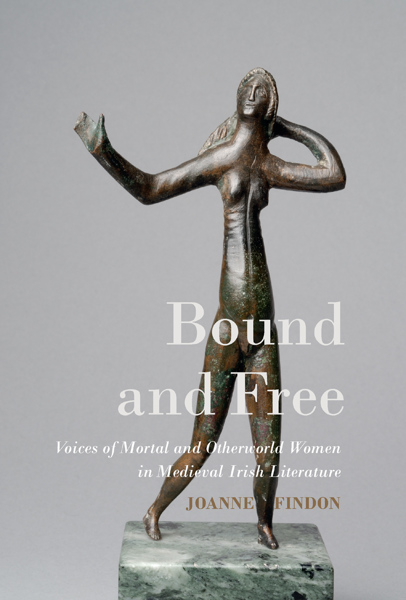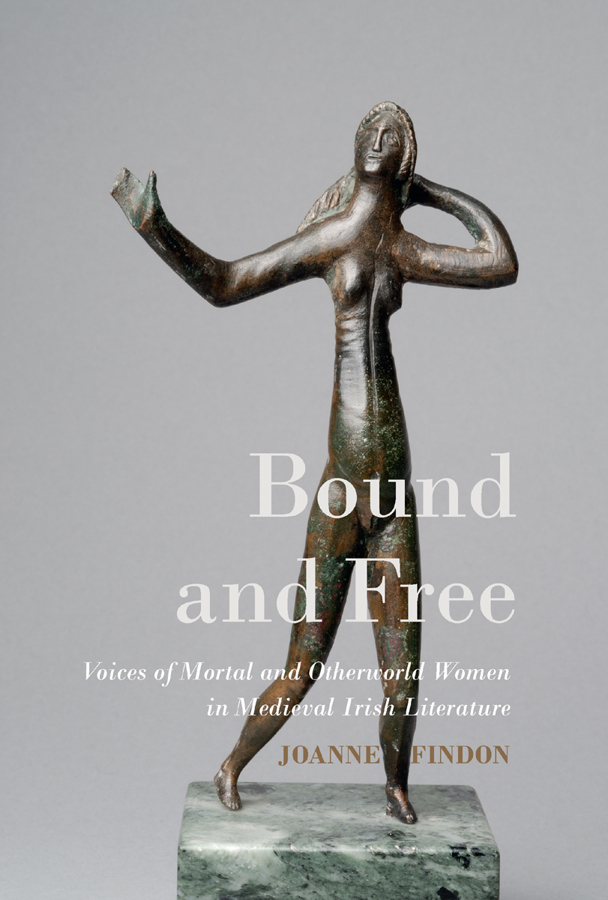
- Pages: 232 p.
- Size:152 x 229 mm
- Language(s):English
- Publication Year:2024
- € 91,00 EXCL. VAT RETAIL PRICE
- ISBN: 978-0-88844-236-9
- Hardback
- Available
“Joanne Findon is at the forefront of the study of women in medieval Irish literature, and has already made groundbreaking contributions, not least with her 1997 monograph, A Woman’s Words: Emer and Female Speech in the Ulster Cycle. Her latest book is a multifaceted exploration of women – both mortal and otherworldly – and their significance in early Irish narrative. Combining cutting-edge scholarship on medieval literature with important critical frameworks from literary theory, Findon sheds new light on the varied roles that women play in what are largely male-authored texts, produced within (and for) a patriarchal society. Engagingly written and accessible, this is an important addition to the bookshelves of anyone working on medieval Irish literature, as well as those interested in medieval literary or feminist studies more broadly.” — Elizabeth Boyle, Maynooth University
Joanne Findon earned her MA and PhD at the Centre for Medieval Studies in the University of Toronto. Her research focuses on women’s speech and agency in medieval Irish and English literature. Her book Lady, Hero, Saint: The Digby Play’s Mary Magdalene (2011) explores the influences of secular literature on the representation of the central female character in a Middle English religious play. Her most recent work continues the exploration of women’s voice, agency and emotion in medieval Irish literature that she began in A Woman’s Words: Emer and Female Speech in the Ulster Cycle (1997), extending the analysis to a number of lesser-known medieval Irish tales. She is Professor Emerita of English Literature at Trent University, where she spent more than two decades teaching courses in medieval romance, Chaucer, medieval drama, creative writing, and children’s literature. She lives in Toronto.
Otherworld women feature in a number of medieval Irish tales. They are not always powerful figures, and their struggles often mirror those of mortal women; authors apparently found them useful for exploring social tensions and issues of contemporary concern. This volume analyzes female figures as literary characters, rather than as mythological beings, focusing on their expression of emotions and the repercussions for the societies depicted in the narratives. Drawing on gender analysis, speech act theory, narratology, disability theory, and trauma theory, and incorporating recent work on emotions in medieval literature, this study probes the representation of both mortal and Otherworld women as active and desiring subjects and the responses that their words and actions might have generated in their medieval audiences.
Acknowledgements
Abbreviations
Introduction
Part One: Mortal Women
CHAPTER ONE
Mother Knows Best: The Role of Nes in Compert Conchobuir
CHAPTER TWO
Fate, the Feminine, and the Flawed King: Conchobor, Deirdriu, and Luaine
CHAPTER THREE
A Woman’s Last Word: Emer’s Construction of the Hero in Brislech Mor Maige Muirthemni
Part Two: Otherworld Women
CHAPTER FOUR
A Good (Mortal) Man is Hard to Find: Otherworld Women and Bad Romance
CHAPTER FIVE
What She Wants: Female Desire and Agency in Tain Bo Froich and Aislinge Oenguso
CHAPTER SIX
The Grieving Otherworld Woman in Serglige Con Culainn, Aided
Derbḟorgaill, and Acallam na Senorach
CHAPTER SEVEN
Aided Derbḟorgaill and the Otherworld Body: Shape-Shifting and
Disability
CHAPTER EIGHT
Dangerous Siren or Abandoned Wife? Gloss versus Text on a Manuscript Page
Conclusion
Bibliography
Index

